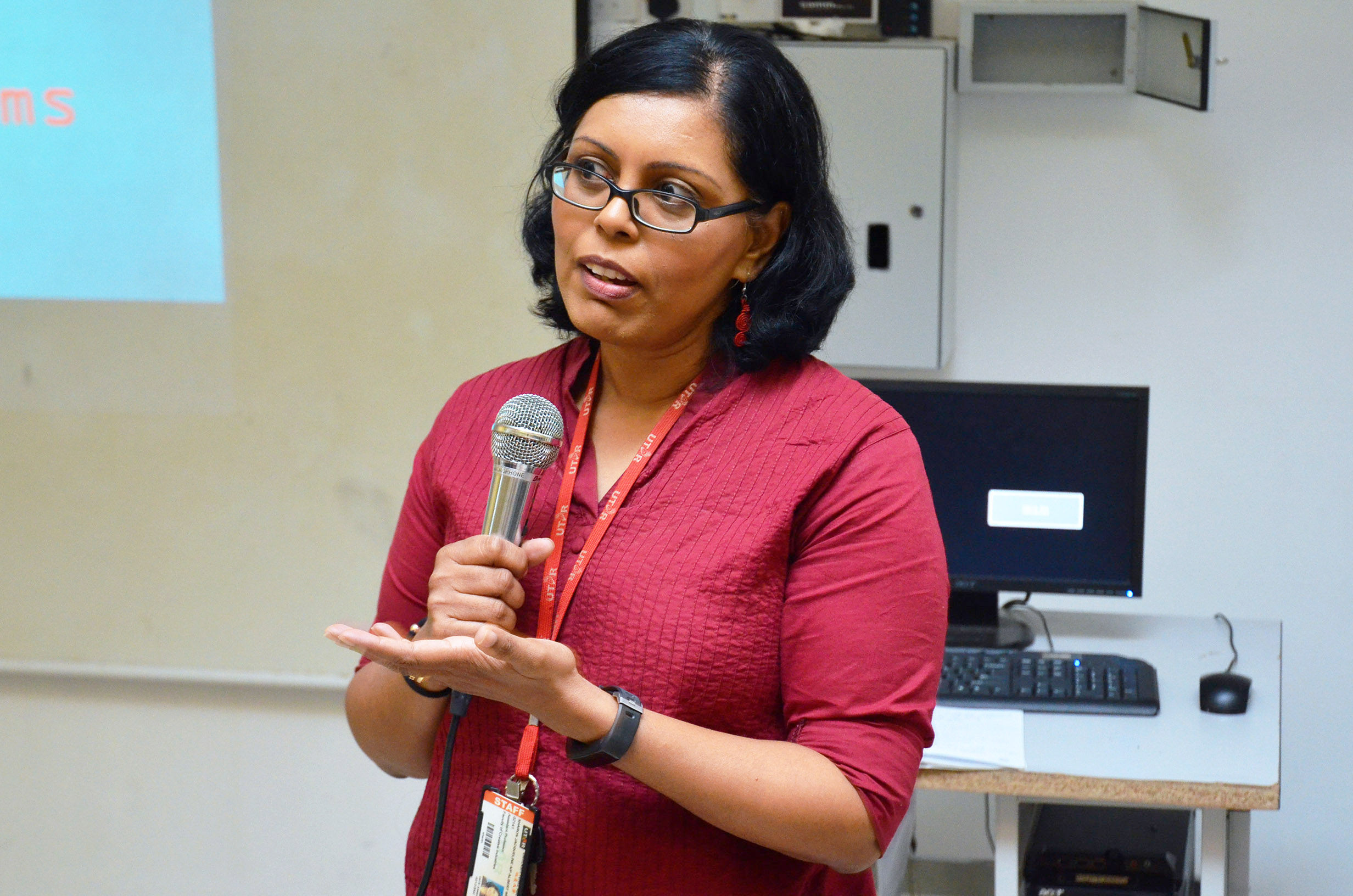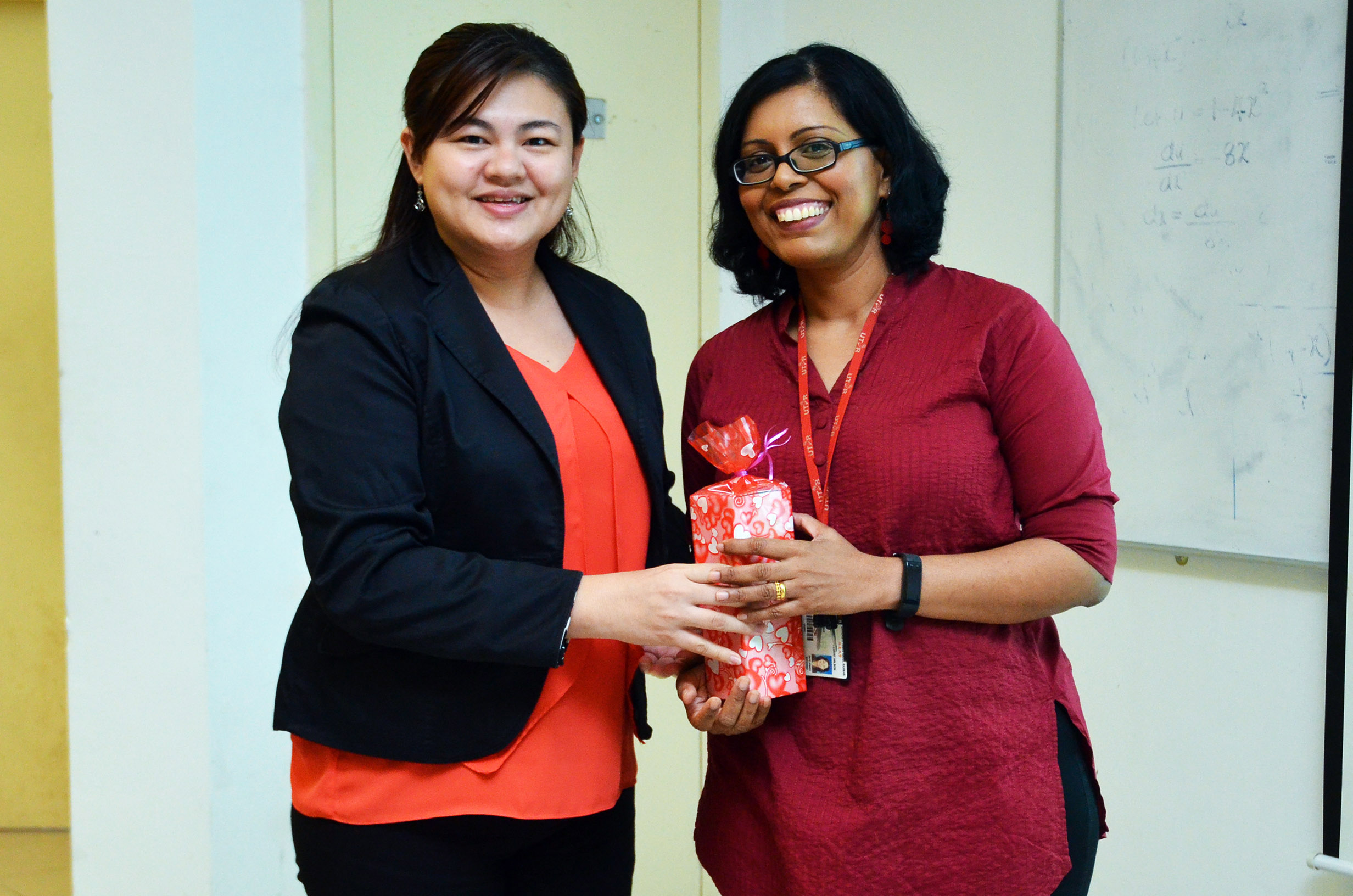


Third from left: Dr Sharon and Dr Wei posing with participants after the talk
The talk titled “Cross Border Teaching and Learning on Virtual Platform” by Faculty of Creative Industries (FCI) academic Dr Sharon Jacqueline was organised by Centre for Learning and Teaching (CLT) on 15 March 2019 at UTAR Kampar Campus.
Present at the talk were CLT Chairperson Dr Wei Chooi Yi, students and staff. The talk aimed to enlighten participants on the use of virtual platforms, such as Facebook, Skype, Whatsapp and Instagram, that can be used to engage students in classes and promote active learning among students. Dr Sharon used three case examples to further explain the effectiveness of the virtual platforms she used to make her classes more interesting for her students.
“When we talk about cross borders, I really meant crossing geographical borders, and in the three case examples I will be using later, the borders we crossed are from Latin America to United States of America (USA) and India,” explained Dr Sharon.
She continued, “It is very common to note that students’ span of attention decreases after some time in classes and that got me thinking on how I can improve the learning environment students are in. It doesn’t have to be expensive tools, but just common virtual platforms that we and the students are already using, and those that are easily available.”

Dr Sharon listing the traits of 21st-century educator
She further explained that one of the many ways to make classes interesting was to engage students in conversations. She also listed the eight traits of a 21st-century educator. The traits were active learning environment; social media savvy; forward thinking; lifelong learner; relevant; student centred; flipped classroom; and collaborative. She also highlighted that the digital era now does not allow educators to be handicapped with digital tools.
The speaker also spoke about the changes in the disciplines of studies. She first explained about interdisciplinary studies, which relates to more than one branch of knowledge, and then explained how multidisciplinary studies combine or involve several academics disciplines or professional specialisations in an approach to a topic or a problem. Lastly, she explained about trans-disciplinary studies.
The first case example she used to elucidate participants was on the use of Skype and Facebook to help students learn new things about Honduras. Dr Sharon spoke about the collaborative project she conducted with a university in Honduras in 2014 to help students of both universities discover things outside their respective countries. The project was proven effective and it even prompted the participating students to do their own research about the countries’ history, background and many other aspects. She mentioned that the project had helped the students expand their knowledge.
The second example was the collaborative project Dr Sharon conducted with Xavier University Bhubaneswar India in 2017, using tools, namely Facebook and Whatsapp. According to Dr Sharon, the project was also a success and it led to a discussion on a collaborative, social and personal level. The participating students even initiated discussion on their own on various topics.
“The third case example was the project I conducted with University of Delaware, Maryland, USA. We used tools, namely Facebook, Whatsapp and Zoom meeting software. Fourteen students from each institution were selected after a series of group interviews. We included participants from different backgrounds that could contribute to the discussion. It was interesting to note how different individuals with different dynamics contributed varying yet valuable opinions on the topics discussed. The result led to more understanding of our UTAR students towards the American students, and vice versa,” explained Dr Sharon.
Towards the end of the talk, she listed a few virtual platform tools that lecturers could use to make classes interesting. The tools include Screencastomatic, coggle, meistertask, plotagon and puzzlemaker.

Participants listening attentively

From left: Dr Wei presenting a token of appreciation to Dr Sharon
![]()
© 2019 UNIVERSITI TUNKU ABDUL RAHMAN DU012(A).
Wholly owned by UTAR Education Foundation Co. No. 578227-M LEGAL STATEMENT TERM OF USAGE PRIVACY NOTICE